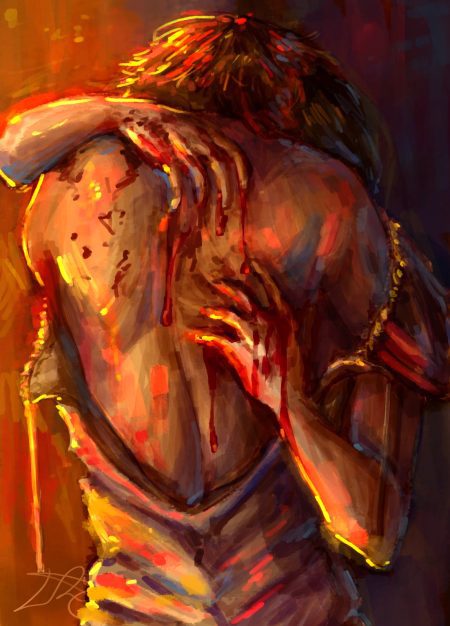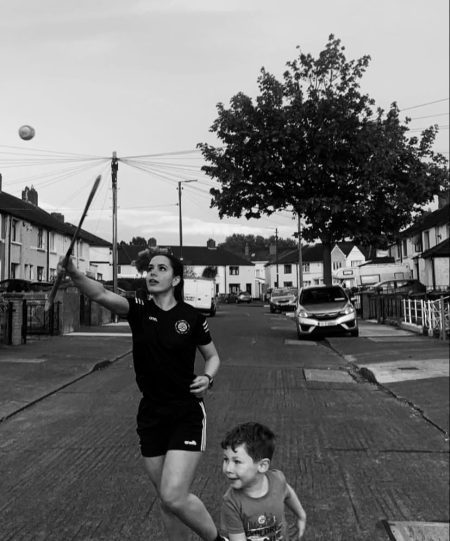written by Helen Power. As a young girl, one of Helen’s (she/her) favourite hobbies was writing “comic book love stories”; as a teenager, she was one of the few girls in class who celebrated when she was given an essay for homework. Fast forward through a husband, four children and a career, Helen rediscovered the joy of writing in a Creative Writing class during the pandemic. It is one of her true pleasures in life.
My journey started and ended in a car park at Sandymount Strand, overlooking the sea and the tall, brutal chimneys of Ringsend Power Station. That car park was my anchor, my copper rod to ground myself. I often pulled in for a few minutes on my drive to work – to remind myself of water, nature, and the real world before I was swallowed by offices, emails and meetings. The water flowed in and out – meekly lapping or furiously hurling itself at the path depending on the weather of the day.
This particular journey started in January 2013. I was going to say it was just a normal Monday morning, driving to work, but it wasn’t normal. My whole world had turned upside down a few weeks earlier when my middle sister had died. My beautiful sister. Forty-nine years young – far too young to die. The cancer had finally got her – nibbling away at her for years, stealing her vibrancy, her beauty, until finally, there was nothing left. I had spent so much time travelling to be with her for her final months – away from my family, away from my job – that when she was finally gone, I ricocheted back to my normal life. Burying myself in busyness. Clamping shut the well of grief.
And then, on this ‘normal’ Monday morning, a song came on the radio – ‘Flares’ by The Script.
Did you find it hard to breathe?
Did you cry so much that you could barely see?
My heart stopped. My lungs stopped. My soul stopped.
My car kept moving.
I needed it to stop along with me.
I steered into the car park at Sandymount Strand and gazed sightlessly at the sea.
Did you see the sparks filled with hope?
You are not alone
‘Cause someone’s out there, sending out flares
The tears started flowing. Ugly, snotty sobs burst from me. I dabbed frantically at my eyes, trying to catch the tears before they ran down my face. Saving my makeup; saving my mascara and saving the face that I would have to show the world when I managed to pull myself together and continue to work. But not yet, not yet.
I hunched and rocked in the car.
The song finished.
I wasn’t ready for it to stop. I turned off the radio and searched for the song on my phone. I found it, and I played it again. Again. And again.
And let the grief flow out. Through my eyes. My nose. My lungs. My pores.
That song became my valve.
I would play it – turn on the faucet of my grief, let it flow, and then turn it off firmly before stepping back into the real world.
My favourite place to play it was on long-haul flights as I travelled around the world with work. I would put on my headphones, pull on my sleep mask, and close my eyes as the music filled my ears. And I would cry and cry and cry – crying rivers of tears, drenching the sleep mask. Other passengers around me were absorbed in their films, or emails, or plastic food. They paid no attention to the sniffling woman cocooned in her own private world.
In the real world, in that first year, people bumbled and bungled around me. My close friends, my patient husband, saying words they meant as comfort. “She was an angel.” “She was such a good person.” But that wasn’t her – she had been wicked, had a devilish sense of humour, a glint in her eye. Each wrong description was like a blunt hammer chipping at the edges of the sculpture of her memory that I was desperately trying to keep intact, away from their clumsy, well-meaning words. I became sharp. Impatient with them. Changing the topic away from their sympathy, ignoring their grief. I was too busy protecting mine, tucking it deeper and deeper. Only releasing it with the music when it threatened to erupt within me.
The world continued to turn. The seasons flowed, one after the other.
Her husband sold their house. He didn’t tell us. My oldest sister rang me and told me. I didn’t blame him. He needed to move on. I would never have wanted him to change anything in that house, so I’d shrugged – better that he moved rather than alter it. I searched and found the ad on a property website and I scrolled through each of the rooms – reliving memories that lurked in each carefully chosen wall colour and each familiar piece of furniture. Remembering scraps of conversations, touches, laughter, and memories imprinted like photographs. That living room. That window. That bed.
He married again after a number of years. His new wife was lovely. I met her at one of the children’s weddings. He’d invited me to meet her before then, but the timing had never worked. I’d dreaded meeting her somewhere so public, but she was lovely, and it was easy. I liked her. In another time, in another world, she might have been a friend. I think my sister would have liked her. My kids really liked her. That night, when we sprawled around our hotel room after the wedding, a little drunk, with feet sore from dancing, they raved about how much fun she was until finally I snapped and said, “Ok, ok, I’d prefer if you liked her just a little bit less.” They laughed at me, and hugged me and told me that they’d never love her as much as my sister. She’d been the best – ‘the bomb’ – high praise from young adults.
As the years moved on, the grief was rubbed down, like a sharp stone that you keep in your pocket and rub and rub over the years, until the edges become softer—blurred.
And I listened to ‘Flares’ less frequently.
Less frequently, but never passively.
Whenever I listened to it, I stopped and really focused on it. Like I was pushing my tongue into a hole in my tooth to see if it still hurts, if it’s still there.
And then today—a beautiful Spring day. I could see the beauty in the harsh brilliance of the sunshine and in the luminosity of the blue sky. I pulled into the car park, into my regular spot, at Sandymount Strand.
It felt fitting to put on ‘Flares’. I realised that I hadn’t listened to it for a long time.
As the familiar notes filled the car, I looked out over the strand. The tide was in, almost all the way. The sea looked beautiful, a gentle blue mirroring the sky – the light catching the movement on the water – soft and slow. It felt easy – like the world was breathing through the ripples of water and sunlight.
I saw three seagulls – just three – dive and dip and soar. Beautiful to watch. Magnetic.
And then one was left slightly behind. And the music played. And I breathed hard.
“Keep up,” I willed the lagging seagull. “Keep up. Don’t leave us. Please don’t let the two of us go. There always has to be three of us.”
And I felt my tears flow softly and gently.
And the song played on.
Image: Wind On Down the Road by Edie Weinstein. Edie Weinstein is currently working towards completing a Joint Honours degree in English and Linguistics at UCD. She is the author of Grandpa and Lucy: A Story about
Love and Dementia and is a proud advocate of dementia education. A native of Saint Paul, Minnesota, she moved to Dublin in 2021 and has since fallen in love with the city (although sometimes she misses her dog, Scout). When Edie isn’t studying, she can be found reading in cafés, playing her trumpet, perusing art galleries, exploring Dublin with her film camera, or sea swimming at the Forty Foot.



